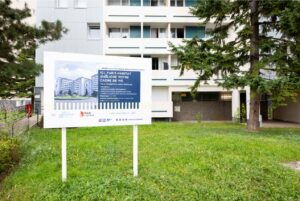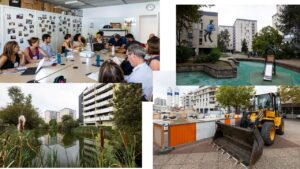Survey on ageing and loss of autonomy in a Val-de-Marne priority district
Tuesday September 5 saw the laying of the foundation stone for the partnership between the Département du Val-de-Marne, the towns of Boissy-Saint-Léger and Limeil-Brévannes, the E-city team and, through them, researchers and students from the Université Paris-Est Créteil (UPEC).
The aim of the meeting? To launch the Haie Griselle-La Hêtraie aging experiment. This inter-municipal district of 5,000 inhabitants, straddling the communes of Limeil and Boissy, is a quartier politique de la ville (QPV) that records a poverty rate of 30% – compared with an average of 17% in the Département – 2018 figures) – and is affected by a very marked aging of its population. Between 2013 and 2018, the number of people aged 75 and over jumped by 70% in Haie Griselle-La Hêtraie, while it remained stable at the Val-de-Marne level. This otherwise younger neighborhood is now seeing its elderly population explode, with the number of people aged 75 and over expected to multiply by 3.76 over the next 10 to 15 years.
 This increase in the number of elderly people living in QPVs raises the question of what intergenerational actions and policies can be put in place here. What are the needs of the elderly and disabled in these neighborhoods in terms of access to services, shops and healthcare, housing adaptation, and the urban environment? What support do they have, and what obstacles do they encounter ?
This increase in the number of elderly people living in QPVs raises the question of what intergenerational actions and policies can be put in place here. What are the needs of the elderly and disabled in these neighborhoods in terms of access to services, shops and healthcare, housing adaptation, and the urban environment? What support do they have, and what obstacles do they encounter ?
 Anticipating this massive ageing of the population in its priority neighbourhoods, the Val-de-Marne department has launched an experimental project aimed at improving the way in which the needs of these people are taken into account. For the Département, the more global challenge is to adopt a set of guidelines favourable to ageing and disability, following the example of the one adopted in 2021 by the DEPARTEMENT DE LA SEINE SAINT DENIS. This is because the public policies implemented to date in priority neighborhoods have tended to focus more on young people and families, neglecting the aging population and those losing their autonomy.
Anticipating this massive ageing of the population in its priority neighbourhoods, the Val-de-Marne department has launched an experimental project aimed at improving the way in which the needs of these people are taken into account. For the Département, the more global challenge is to adopt a set of guidelines favourable to ageing and disability, following the example of the one adopted in 2021 by the DEPARTEMENT DE LA SEINE SAINT DENIS. This is because the public policies implemented to date in priority neighborhoods have tended to focus more on young people and families, neglecting the aging population and those losing their autonomy.
To conduct this experiment, the Département du Val-de-Marne turned to its reference university: Université Paris-Est Créteil (UPEC). This partnership is being carried out through E-city, a UPEC urban health research-action program launched in 2020 and headed by Prof. Dr. Marcus Zepf and Isabelle Coll, which aims to study socio-environmental health issues in the eastern and southern parts of the Paris region.
 The E-city team, including Manon Monvoisin (sociology research engineer) and Ryma Hachi, Ph.D. (project manager), joined the Haie Griselle project’s Technical Committee (COTECH) to implement the experiment. On the scientific front, our team set up a scientific committee to validate the methodology and pursue the best avenues of research. In carrying out this project, E-city will be supported by the Department’s referents, including Natalia Castro Alvarado (Population Relations Department), MAXIME NAWRACALA (Autonomy Department), Christophe Ambroise (Planning, Innovation and Territorial Solidarity Department – DAIST), Estelle SEDILOT (DAIST) and Anne Gaelle LEYDIER (DAIST). The COTECH also includes municipal department heads, including ZAHRA OUAGA (director of social action and health) and Habib Bensetti (city policy project manager) on the Limeil side, and Sonia Mokadem (director of the Michel Catonné social center) and Lina Therese (municipal services) on the Boissy side. Finally, Grand Paris Sud Est Avenir is involved through Carine Tardy (coordinator of urban policy and urban renewal) and Erwan Reveillant (deputy director of territorial cohesion).
The E-city team, including Manon Monvoisin (sociology research engineer) and Ryma Hachi, Ph.D. (project manager), joined the Haie Griselle project’s Technical Committee (COTECH) to implement the experiment. On the scientific front, our team set up a scientific committee to validate the methodology and pursue the best avenues of research. In carrying out this project, E-city will be supported by the Department’s referents, including Natalia Castro Alvarado (Population Relations Department), MAXIME NAWRACALA (Autonomy Department), Christophe Ambroise (Planning, Innovation and Territorial Solidarity Department – DAIST), Estelle SEDILOT (DAIST) and Anne Gaelle LEYDIER (DAIST). The COTECH also includes municipal department heads, including ZAHRA OUAGA (director of social action and health) and Habib Bensetti (city policy project manager) on the Limeil side, and Sonia Mokadem (director of the Michel Catonné social center) and Lina Therese (municipal services) on the Boissy side. Finally, Grand Paris Sud Est Avenir is involved through Carine Tardy (coordinator of urban policy and urban renewal) and Erwan Reveillant (deputy director of territorial cohesion).
In response to this demand, E-city is proposing an innovative project management approach which, in addition to its own human resources, mobilizes UPEC researchers and teacher-researchers, as well as students from the university. Our team includes students from the Master 2 Urbanisme et Aménagement program at the École d’Urbanisme de Paris (EUP), tutored by Pascale LAPALUD, urban planner-designer and associate professor at the EUP, and Samuel Buteau, urban planner and project manager at Des cris des villes. From October to the end of March, a group of 8 students will be surveying the site, making observations, organizing participatory workshops and conducting exploratory interviews. This data collection will give rise to an initial diagnosis of the situation of people losing their autonomy at la Haie Griselle. Students in the Master 2 Sciences de l’éducation program, led by Laurence COSTES, a university professor in sociology, will continue an intensive seminar from October to January, focusing in particular on representations. What social representations do young and old have of people losing their independence? What role do the elderly play in the neighborhood, and what relationships exist or can be forged between generations ? What intergenerational initiatives can we undertake to meet the challenges of aging ? The questions will be rich! E-city will also be mobilizing 2 student internships, lasting 5 and 3 months respectively.
The multi-disciplinary scientific committee chosen to provide methodological support for our team includes researchers from UPEC who have expressed an interest in the project. They are Dominique Argoud (sociologist, interdisciplinary research laboratory on transformations in educational and social practices, Dean of the Faculty of Education, Social Sciences and Staps), Nadia Oubaya (epidemiologist, Public Health Department – Henri Mondor Hospital), Myriam Baron (human geography, professor attached to Lab’urba), Léa Prost-Lançon (health geographer, senior lecturer at Lab’Urba), Gaétan Hains (computer sciences, professor), Marie Laurent (geriatrician, IMRB, CNRS), Abdelmajid AMINE (management sciences, researcher and professor, former director of the Institut de Recherche en Gestion), and Daryane TELON (doctoral student in public health, coordinator of the UPEC health network), with the involvement of Hajar HBAILI, operational director of the Campus des Métiers et des Qualifications d’Excellence – Santé Autonomie Bien vieillir.

